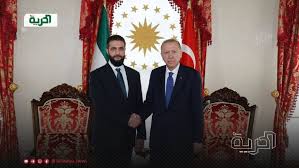In a surprise, unannounced visit, Syria’s transitional president Ahmad al-Sharaa met with Turkish President Recep Tayyip Erdoğan on Saturday in a high-level meeting at the Dolmabahçe Palace in Istanbul. Erdoğan received Sharaa with official honors, marking a significant moment in Syrian-Turkish relations following the recent lifting of U.S. sanctions on Syria.
The visit comes just days after the United States granted Syria a comprehensive sanctions waiver, including a 180-day suspension of the Caesar Act, signaling a dramatic shift in the geopolitical handling of the Syrian file. Meanwhile, talks between Damascus and the Syrian Democratic Forces (SDF) continue over the implementation of a pivotal agreement signed between Sharaa and SDF commander Mazloum Abdi in March.
Behind Closed Doors
The meeting, which brought together top officials from both governments, was held away from the media spotlight. No official statements or press releases were issued by either Ankara or Damascus at the time of publication, leaving much to speculation. However, the military and security-heavy composition of the delegations suggested a focus on defense and intelligence coordination.
From the Syrian side, Foreign Minister Asaad Hassan al-Shaibani and Defense Minister Marhaf Abu Qasra attended, along with several senior officials. On the Turkish side, participants included Foreign Minister Hakan Fidan, Defense Minister Yaşar Güler, Intelligence Chief İbrahim Kalın, and Haluk Görgün, head of the Defence Industries Presidency.
The visit unfolded amid rapid political developments in Syria’s post-Assad phase, with Damascus pushing to consolidate internal stability and attract regional support for reconstruction now that the sanctions regime has been rolled back.
What Was on the Table?
Although neither side disclosed the meeting’s agenda, the timing—just one day after Washington suspended the Caesar Act—strongly suggests that the discussions revolved around next steps in Syria’s transition. U.S. Secretary of State Marco Rubio recently emphasized the need for Damascus to take “swift action in high-priority political domains” to capitalize on the sanctions relief.
One of the key topics was likely the implementation of the March agreement between Sharaa and Mazloum Abdi. The eight-point accord calls for:
- A nationwide ceasefire
- Full integration of the SDF into the Syrian Ministry of Defense
- Unification of civilian and military institutions in northern and eastern Syria under the central government’s authority
- Inclusion of border crossings and oil and gas fields in Damascus-led governance
- A categorical rejection of ethnic or sectarian-based federalism
The Turkish president has voiced strong support for this agreement. In recent remarks aboard his return flight from Budapest, Erdoğan urged Damascus to honor its deal with the SDF, stressing that “it is critical the Syrian administration not lose sight of the YPG issue.” He also called for trilateral cooperation between Syria, Turkey, and Iraq to address the issue of ISIS detainee camps in northeast Syria.
Sharaa’s Istanbul visit coincided with the arrival of a Syrian government delegation in northeastern Syria to begin taking control of prisons and detention centers housing ISIS fighters and their families. The transfer, coordinated with the SDF and under the supervision of the U.S.-led coalition, represents a key milestone in restoring state authority over Syria’s fractured northeast.
According to local sources, the delegation included representatives from the ministries of interior and foreign affairs, as well as intelligence officers. During a closed-door meeting with officials from the Autonomous Administration, discussions focused on setting legal and security criteria for repatriating displaced Syrians from the camps to their original hometowns.
Turkish Intelligence in Damascus
This diplomatic flurry follows another important visit earlier in the week, when Turkish intelligence chief İbrahim Kalın traveled to Damascus. There, he met with President Sharaa, Foreign Minister al-Shaibani, and Syrian intelligence director Hussein al-Salama.
The discussions reportedly covered critical issues such as:
- The phased lifting of sanctions
- Counterterrorism cooperation against ISIS
- The technical and administrative handover of ISIS detention facilities to Syrian authorities
These developments point to a rapidly evolving security and diplomatic alignment between Damascus and Ankara, one that may lay the groundwork for deeper normalization—if sustained by progress on the ground.
The Istanbul meeting between Sharaa and Erdoğan, though shrouded in secrecy, marks a turning point in Syria-Turkey relations and highlights the delicate choreography underway in the region’s post-war recovery. With sanctions lifted, Damascus faces mounting expectations—not just from the West, but from regional actors like Turkey—to deliver political coherence, reassert state control, and stabilize the northeast.
Whether these steps lead to a lasting settlement or merely manage short-term crises will depend on what follows behind the scenes—and how far the transitional government is willing to go in transforming decades of fractured rule into something resembling a functioning, inclusive state.
This article was translated and edited by The Syrian Observer. The Syrian Observer has not verified the content of this story. Responsibility for the information and views set out in this article lies entirely with the author.


